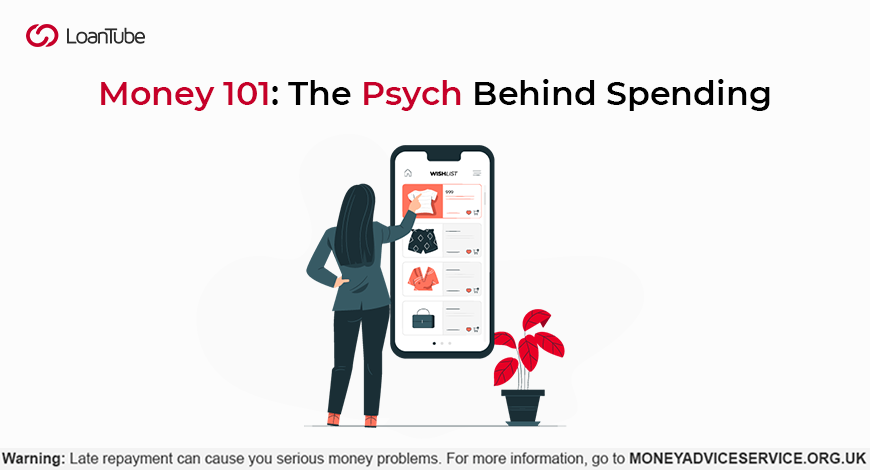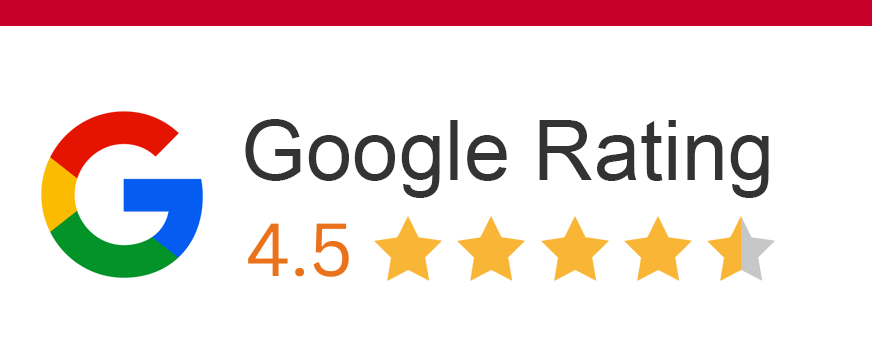We’re all guilty of making impulse purchases at some point in our lives. Whether it’s that dress you bought to celebrate the summer spirit but never ended up wearing it or that treadmill which is now reduced to a clothing rack, we’ve all made some irrational shopping decisions.
If you want to mend your spending habits and start saving responsibly, it is imperative for you to understand your relationship with money. But before we walk down that road, you also need to understand the psychological aspect of shopping.
In this article, we’ll learn more about how psychology governs our spending behaviour. Read on to learn six methods to train your brain to spend smartly.
Maximise your options: Compare and apply for loans below with LoanTube
Apply Filters

Loan Amount
£4000 -
£20000
Norwich Trust
Loan Term
1 -
10 years
4.8/5
Representative APR
31.90%
Minimum Age
21 Years
Representative Example: £12,000 over 66 months, 31.9% APR fixed. Monthly payment £358.22 Annual interest rate 28.01% fixed. Interest payable £11,642.52. Total repayable £23,642.52.

4.8/5
Norwich Trust
Loan Amount
£4000 -
£20000
Loan Term
1 -
10 years
Representative APR
31.90%
Minimum Age
21 Years
Minimum Income
£2000 per month
Representative Example: £12,000 over 66 months, 31.9% APR fixed. Monthly payment £358.22 Annual interest rate 28.01% fixed. Interest payable £11,642.52. Total repayable £23,642.52.

Loan Amount
£5000 -
£100000
Evolution Money Loans
Loan Term
1 -
20 years
4.5/5
Representative APR
28.96%
Minimum Age
18 years
Representative Example: Loan Amount: £20950.00, Loan Term: 85 Months, Interest Rate: 23.00% PA Variable. Monthly Repayments: £537.44. Total Amount Repayable: £45,682.15. This example includes a Product Fee of £2,095.00 (10% of the loan amount) and a Lending Fee of £714.00

4.5/5
Evolution Money Loans
Loan Amount
£5000 -
£100000
Loan Term
1 -
20 years
Representative APR
28.96%
Minimum Age
18 years
Minimum Income
Not mentioned
Representative Example: Loan Amount: £20950.00, Loan Term: 85 Months, Interest Rate: 23.00% PA Variable. Monthly Repayments: £537.44. Total Amount Repayable: £45,682.15. This example includes a Product Fee of £2,095.00 (10% of the loan amount) and a Lending Fee of £714.00

Loan Amount
£1000 -
£10000
1Plus1 Guarantor Loans
Loan Term
1 -
5 years
4.4/5
Representative APR
39.90%
Minimum Age
18 years
Representative Example: Borrowing £3000 over 36 months with a representative APR of 39.9% (variable),the amount payable would be £134.21 a month,with a total cost of credit of £1831.56 and a total amount payable of £4831.56.

4.4/5
1Plus1 Guarantor Loans
Loan Amount
£1000 -
£10000
Loan Term
1 -
5 years
Representative APR
39.90%
Minimum Age
18 years
Minimum Income
Not mentioned
Representative Example: Borrowing £3000 over 36 months with a representative APR of 39.9% (variable),the amount payable would be £134.21 a month,with a total cost of credit of £1831.56 and a total amount payable of £4831.56.
Here’s what your spending patterns mean
- Immediate gratification: Have you ever noticed how you tend to buy coffee from a café every day, even though you can always carry some in a travel mug? Or that time when you were just too lazy to cook and ended up ordering takeout? Doesn’t it seem like it’s all about immediate pleasures? Well, that’s instant gratification for you. Rather than waiting for larger, delayed rewards, people prefer smaller, more immediate ones. People who don’t overspend tend to have better impulse control and a willingness to delay gratification.
- Effects of the scarcity principle: The fear of missing out or #FOMO is a phenomenon that majorly governs our life choices. The technical term for this FOMO of ours is the scarcity principle, which states that the less available a product or service is, the more we desire it. For instance, if you come across a ‘limited time’ or ‘time is running out’ deal online, you feel more drawn towards the product, fearing that you might lose out on the opportunity to buy it. This urgency that marketers create by offering a limited response time is why people end up spending unnecessarily. It’s all about the race to claim the product at a particular price bracket.
- Irretrievable expenditures: Irretrievable expenses or sunk cost is a past expenses that you have already incurred. You cannot recover this money. For instance, in the case of business owners, a sunken cost could be the money that you’ve spent on business equipment or machinery. Now, regardless of whether or not you deploy this machinery, you’ve paid for it and cannot recover every single penny spent on it. A more familiar example would be one from our everyday lives – a gym membership, per se. It’s the second day of January, and you’re feeling pumped. You’re more motivated this year than ever and head to the gym to buy a half-yearly membership. You’ll feel empowered for the first few weeks, right before reality kicks in, and you realise that you don’t actually like working out in a gym and would much rather stick to home workouts or yoga. Now, you’ve already spent a fortune to get your gym membership, which is a sunk cost since you cannot recover it. Renewing it would mean throwing away more money. It is always better to cancel the membership and put your money towards a more plausible cause in such a scenario.
- Anchoring: The principle of anchoring explains people’s approach towards the price points of products when making a spending decision. Let’s consider a simple instance from our daily lives: suppose you’re shopping online and come across a dress which originally costs £150, the anchor price, but its sale price is £75. Instinctively, you will be fixated on the anchor price (£150) and consider the £75 price a ‘steal deal’. For all we know, the store could’ve inflated the original price, or you may not even need this item in the first place. But you end up buying the dress because you’re anchoring on to £75 that you’re saving, rather than the £75 that you will be spending.
- Social facilitation: Even if you’re not particularly gullible, it is quite possible to be influenced by the people around you. Besides, sometimes the people around you can actually help you make better choices. This phenomenon is referred to as social facilitation – the presence of other people influencing you positively to accomplish something. For instance, you’re likely to be more productive in a competitive environment full of people, like an office or university, than at home. Although, when it comes to spending patterns, social facilitation works in a diametrically opposite fashion. For instance, let’s consider the example of an auction – where a room full of people are in a bidding war to own an item exclusively. Yes, emphasis on ‘exclusively’, driving a psychological impulse and clouding your rationale. Therefore, the next time you get caught in the middle of such a setting, take some time to calm the adrenaline and think through your decisions.
6 psychological methods to train your spendthrift brain
Rationalising your spending decisions rather than pushing yourself to curb spending will help you stay motivated through your journey. Here are six superb tricks to help you trick your brain, straight from the magician’s hat!
- Use new notes when shopping: It isn’t easy to part with a crispy new note. We love how it’s immaculately in our wallets. You’d rather not shop at all than spend those new bills – unless it’s absolutely necessary, of course!
- Wear heels on a shopping spree: Wearing heels shifts your focus to staying balanced. The more balanced you feel, the less likely you are to take an impulsive decision.
- Practice planned pauses: Try to make logical sense of your purchase by asking yourself questions like “why am I in this store?”, “what was I looking for?”, “do I need this item?”, “how am I going to pay for this?” and “how will I feel about this purchase?”.
- Visit a limited number of outlets: The key to cost-effective shopping is to check out stores that already have the items you’re looking for and then go shopping.
- Avoid being too friendly with the sales staff: Now, we’re not asking you to shun them aside. However, being too friendly can make you feel like you owe them something, and hence, you may feel obligated to purchase from the store.
- Don’t carry your credit card: When you carry your credit card, you’re more likely to rely on credit as soon as you run out of cash. Credit cards prove to be more expensive since you’ll have to pay a hefty interest towards your repayment. Plus, the fact that the money doesn’t get deducted from your bank account instantly can encourage you to spend more. Therefore, carrying your credit card will only be counter-productive if you’re trying to discipline yourself.
Conclusion
Habits take time to form, but it takes even longer to change them. But, the first step towards change is to understand your relationship with money and your financial triggers; the rest will follow.


